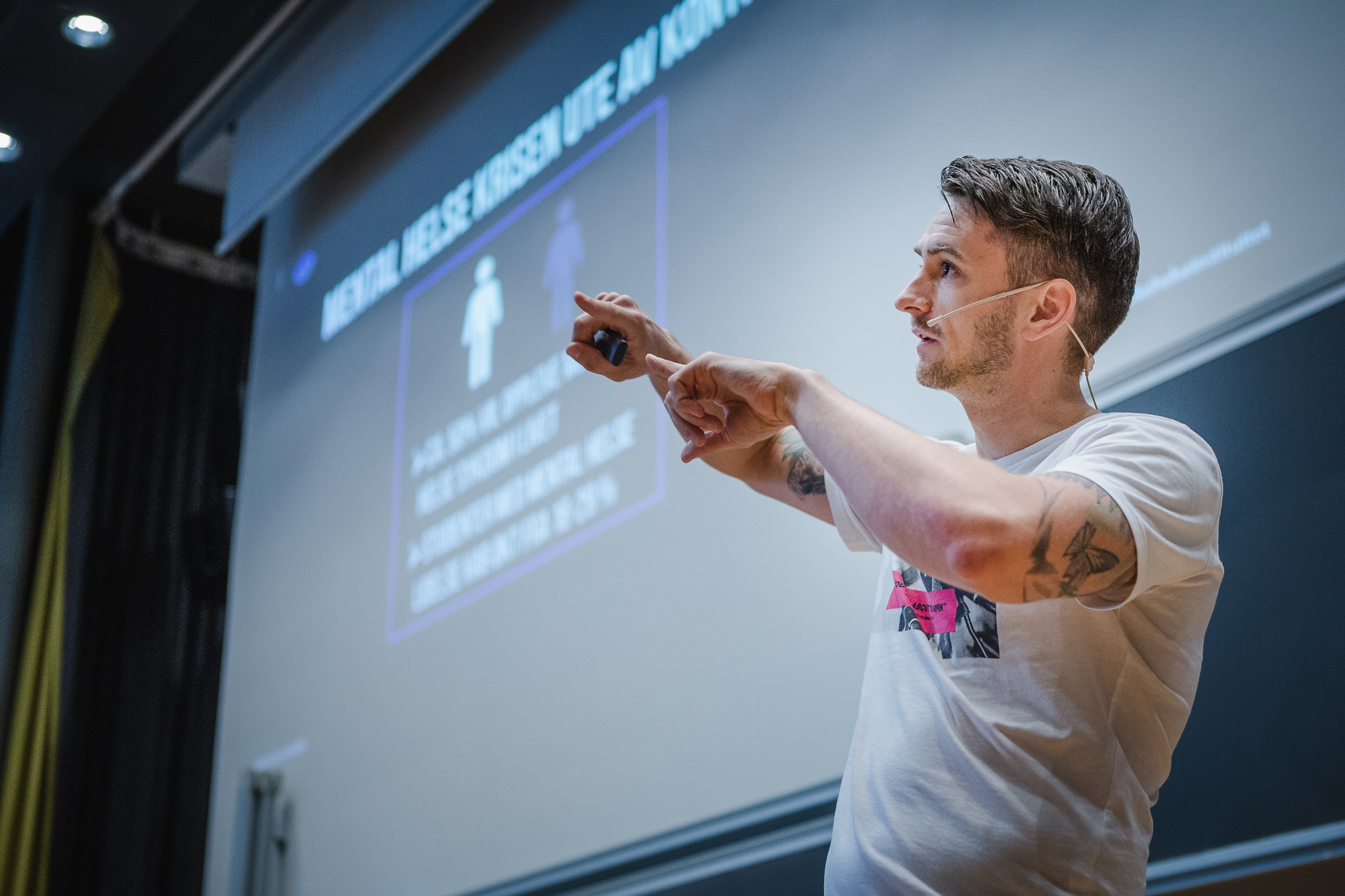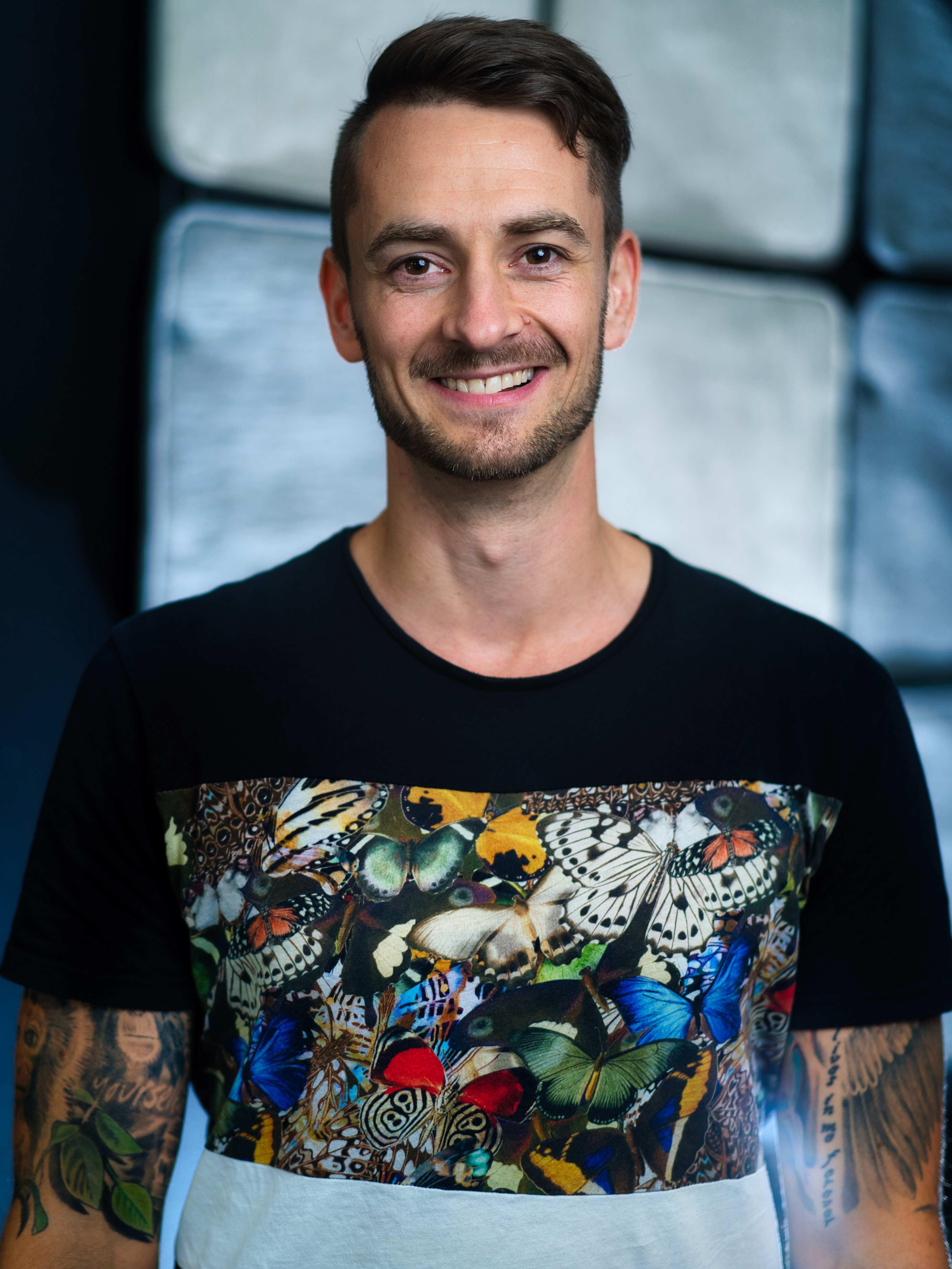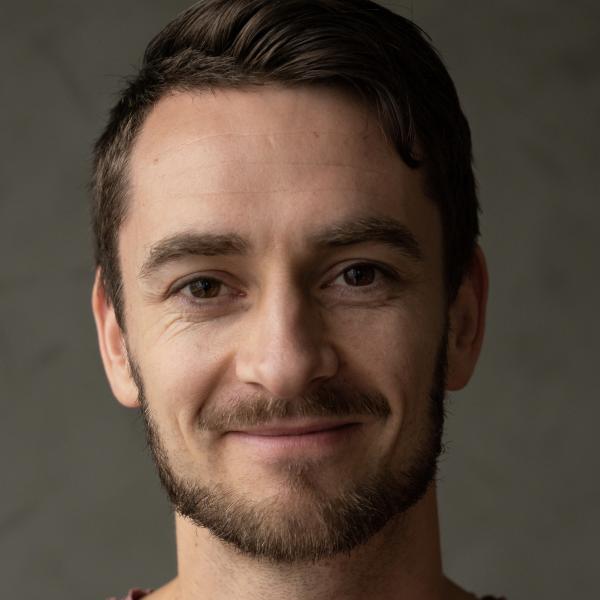Jimmy Westerheim
Founder and CEO, The Human Aspect
Fellow project website: www.thehumanaspect.com
In a world where trained mental health professionals can hardly begin to reach all those in need, the world has long needed a peer-to-peer alternative model that meets the gap in provision and shores up formal systems. Jimmy makes recorded stories of people like you, who have been through a mental health challenge like yours easily available to all.

THE NEW IDEA
Imagine that you are struggling emotionally and mentally, and you don’t know how to think or talk about it, don’t have access to professional help (or even know how to find it), and are reluctant to talk to family and friends, who, in any case, would have little idea what to do.
Jimmy has discovered a unique new form of help for you. Jimmy’s organization, The Human Aspect, skillfully interviews people like you, people who have experienced similar challenges, and struggled. They are also different from you, and like you will be soon – they have returned to health. Jimmy has discovered that by watching these profoundly relatable video interviews you only understand that so many others have experienced the same difficulties. And more than that you develop your own capacity successfully to regain your own mental health. Jimmy makes these stories easily and broadly accessible – through the media, online, as a part of the regular high school and college experience, and even increased as a tool that psychologists use to reach patients more effectively.
This approach is showing such promise that it is being touted as the most effective innovation in how society deals with its growing mental health problem. According to the UN, over 10 percent of the world’s population is affected.
By making clear that wrestling with mental health issues is common, in fact, “normal”, and that people like you regularly struggle and succeed, Jimmy’s approach replaces despair, fear, and shame with connection, determination, and self-efficacy.
By flipping the mental health resource pyramid on its head, Jimmy is enabling people with limited access to professional care to share their experiences and learn from peers. Furthermore, Jimmy’s model helps us all support those struggling with mental health – classmates, friends, neighbors, and family – to better understand the nature of these adversities and to grasp how they can help.

Ashoka 2022.
Jimmy’s model is spreading virally around the world, spurred on by Jimmy’s entrepreneurial creativity and drive. The interview recordings are free and easily accessed from the ‘Life Experience Library’, which operates from multiple online platforms. Proactive positioning aims for high-need areas, such as refugee reception centers. The library currently holds over 750 interviews, which have been viewed more than 1.6 million times across 190 countries. The interviews profile both everyday people and well-known influencers, deliberately underlining the message that mental anguish can cripple anyone, anywhere. Users can select themes like depression, anxiety, addiction, grief, poverty, dyslexia, and traumas resulting from conflict and displacement. A relentless innovator, Jimmy’s most recent addition is podcasts. The Norwegian-language podcast has just surpassed 650,000 downloads in a country of 5.3 million. The English-language podcast will re-launch this year. Governments are beginning to build Jimmy’s work into public health systems. In particular, the UK’s National Health Service is exploring how to integrate Jimmy’s videos into their online mental healthcare programs.
THE PROBLEM
In Norway, Jimmy’s home government has pledged to prioritize mental health, yet stigma remains around the topic, especially for the young people who are most at risk. Depression and anxiety have become the third and fourth most common causes of non-fatal illness in the country. The World Health Organization reports similarly dismal patterns across the world. Those affected often don’t know how to seek treatment, and, even if they do, finding a therapist can be extremely difficult due to the long queues of patients. In Norway, the availability gap in mental health services is so severe that the OECD has explicitly advised the government to address it proactively. In addition, recent studies from universities across Norway indicate that the proportion of students with debilitating mental challenges, such as anxiety or depression, has increased by roughly 7 percent for men and women from 2010 to 2021.
Although mental health challenges are commonplace, conversations about them remain rare. Schools and workplaces rarely address these challenges, and people afflicted with poor mental health often feel broken or alone. Due to bureaucracy, limited resources, and increasing demand worldwide, professional care has become harder to find and more expensive. The global mental health crisis continues to grow.
It’s really hard to relate to a therapist or doctor who hasn’t got anything in common with you who is trying to help you. How about you listen to someone of a similar age, same gender, with the same experiences and they will tell you how they overcame that experience. You have someone you can connect to and feel understands you.
MAXIE EARLE, Volunteer with The Human Aspect
The World Health Organization reported a widening gap between the number of trained mental healthcare professionals and the number of people needing their services. On average, developed countries need 40 to 60 percent more trained professionals to meet the estimated demand. The need for providers in developing countries like India is many, many times higher. Additionally, funding for public health agencies to engage in effective interventions remains chronically insufficient. Although public health officials run information campaigns, their impact is limited. Groups with information about how to manage one’s mental health are difficult to access and are too few in comparison to the growing number of people in need.
The existing mental health resource pyramid is not capable of meeting the population’s needs. Those at the bottom of society suffer the most yet again. Increasing natural (and man-made) disasters and refugee flows further increase the imbalance between need and what the traditional professional dependent system can provide.
THE STRATEGY
Jimmy’s model works by destigmatizing conversations about mental health struggles and turns those conversations into a new language that anyone can use to heal themselves.
To realize the model, Jimmy employs a highly original four-step approach. First, using a large volunteer base, The Human Aspect records high-quality first-person stories of overcoming mental health challenges.
Second, he teams up with social media platforms to ensure that his Life Experience Library profiles are freely accessible everywhere. He uses the data gathered to inform future programming to reach more people and better arrive at the needs of communities.
Third, Jimmy partners with schools in Oslo and around the world to engage them in conversations related to changing the way young people learn about and understand mental health.
Fourth, he enriches current mental healthcare provision across Norway and other countries such as Poland, Latvia, the UK, and Nepal by sharing Life Experience Library videos with therapists and professionals, as well as developing additional resources specifically for powerful delivery vectors like public health systems.
To ensure that as many people as possible can access the Life Experience Library, Jimmy and his team create abbreviated versions of each interview. This allows a wide audience to engage with their social media platforms, which over time have garnered a broad global distribution. These videos are designed to engage viewers who are suffering in silence, showing how they are not alone, how others have managed to deal with similar struggles, and that they can do the same. The library is also designed to increase the general knowledge of common mental health illnesses, conditions, and struggles, so people who want to help someone in their own social circles are empowered. For example, three-minute teasers are posted to The Human Aspect’s Facebook page, which currently has more than 150,000 followers. Jimmy has coined a new term ‘spending positive time on Facebook as part of his efforts to transform the way people use social media and how they perceive mental health. Links to the full-length interviews are also included in the posts. A partnership with Facebook, which considers Jimmy’s digital platform and no-cost access particularly compelling, has ensured that The Human Aspect can share its abbreviated clips and Library links to users in nearly every country. On top of this, Google’s robust platform, including its geo-location service, allows Jimmy to know where videos are viewed most frequently. This drives decisions about whom to interview and what languages to target in the future.
Furthermore, much of The Human Aspect’s impact to date is measured qualitatively rather than in numbers alone. Feedback from users across six continents points to the deep impact that the lived experience videos have had on the way people address their mental health. Each interview is categorized, so users can quickly conduct searches based on their specific needs or interests. People from 95 countries appear in the Life Experience Library videos, and while the primary language used is English, interviews are also conducted in Arabic, Somali, Turkish, Tigrinya, Norwegian, Icelandic, Swedish, Danish, French, and German.
Jimmy also caters to the many who have limited (or no) access to high-speed Internet and are therefore unable to watch Life Experience videos. To tackle this reality, he is now developing audio-only versions and investigating video compression technology, so the most vulnerable or marginalized can access the site’s resources. The Human Aspect has also started a Norwegian-language podcast (www.hverdagspsyken.no) to ensure that its message about mental health reaches as many people as possible. The podcast just surpassed more than 650,000 down-loads in a country of 5.3 million. The podcast hosts both mental healthcare professionals and those affected by poor mental health. Recent topics include social anxiety, burnout, animals as therapeutic tools, men and mental health, and the effects of being dyslexic. A new episode is released every Monday. Their English-language podcast is also re-launching this year.

Jimmy also partners with Oslo schools and universities to ensure that young people have access to real-life examples of people living with mental health struggles and vivid examples of how others have overcome them. Use of The Life Experience videos in classrooms ensures that more students grow up knowing that mental health challenges are common and that they can be comfortable talking about their own struggles. To accommodate the national curriculum’s new ‘Life Mastery’ course for all high school students, Jimmy launched a companion digital educational platform in the summer of 2021. Jimmy is introducing the platform in several schools and conducting research to measure its impact on students. Teachers are also using the platform to find slide decks created by The Human Aspect team that match specific objectives with relevant Life Experience videos. This variety of courses has improved teachers’ and students’ understanding of mental health.
While the primary language used is English, interviews are also conducted in Arabic, Somali, Turkish, Tigrinya, Norwegian, Icelandic, Swedish, Danish, French and German.
Additionally, Human Aspects also collaborates with professors at Oslo University, Oslo Metropolitan University, and other institutions to introduce the Life Experience Library in curricula. The Oslo-based higher education institution Høyskolen Kristiania has included The Hu-man Aspect’s interviews into curricula for three different psychology degrees to help bridge the gap between academic case studies and real-life stories. Together, they are conducting qualitative studies on student learning experiences. Furthermore, academic institutions in the UK, Ukraine, Sierra Leone, Nepal, and elsewhere have now begun supplementing coursework with the Life Experience videos.
The Human Aspect brings a profoundly different approach to mental health, and clinics of professional psychologists, psychiatrists, and therapists in Norway are using the Life Experience videos as tools to help their patients feel less alone and ashamed. In November 2021, more than 3,000 mental health professionals at Schizofrenidagene, Scandinavia’s largest conference for mental health professionals, were introduced to interview excerpts provided by The Human Aspect. This reach amongst professionals continues to grow. Jimmy, along with several professional partners, is now testing how different therapy sessions across the country perform when employing his model. Additionally, he is in discussions with both local and regional governments, as well as Norway’s National Health Department and the Norwegian Digital Health Directorate, to determine the best method to use the Life Experience Library as a tool for primary and specialized health care workers. The UK’s National Health Service, as well as healthcare providers in Warsaw and Rotterdam, are exploring how to integrate the videos into their online mental healthcare programs.
To complement the videos’ impact, Jimmy and his team have launched Norway’s first Help Resource Page (www.hjelpesiden.no), which lists all the helplines and digital mental health resource links in an accessible and user-friendly way. The team has also started initial work identifying resources to launch similar pages in other countries, including Greece, the UK, and Nepal. On top of this, Jimmy is partnering with the World Health Organization to verify information on resources for mental health around the world.
Jimmy’s next steps include making it possible for users to download interviews from anywhere – while at an Internet café for example – and watch them offline – similar to how people use Netflix and Spotify. Jimmy and his team have created a user guide for Life Experience Library viewers, so they can effectively manage their own challenges through the strategic use of interview learnings.
In order to secure new funding streams, Jimmy’s organization is launching a paid membership portion of The Human Aspect website for mental health professionals. The baseline resources for this website will be downloadable user guides for Human Resource managers, psychologists, prison professionals, and professional descriptions of Life Experience interviews.
THE PERSON
Jimmy grew up in a town of around 500 people where he says boys were expected to push through difficult feelings and experiences rather than draw attention by asking for help. In his case, he had to keep inside his feelings arising from an absent, abusive dad and chronically ill mum affected. Despite these travails, or perhaps because of them, at a young age, he found his gift for recognizing his peers’ talents and leveraging their individual abilities by fostering collaboration. For example, during recess time at school, Jimmy noticed who was better at foraging and who was more design-minded. He recalls that he would use that information to build teams where everyone could contribute. In this way, he spread a sense of fairness and belonging. As he got older, Jimmy became a coach at a local summer camp and used these skills to foster a supportive team environment in which everyone felt committed and valued.
Despite assuming leadership roles, Jimmy realized his own biggest obstacle to improving his mental health was himself. Believing this ironic flaw was common if not universal, he named his social venture, ‘The Human Aspect’. Jimmy believes mental health struggles and challenges are something all humans experience and should, therefore, be seen as a simple reality for all of humanity rather than a failure or source of shame.
Jimmy’s first positive role model was his grandmother. He remembers her practicing empathy with humility. She brought joy and warmth to people’s lives through her commitment to helping others. It wasn’t until after Jimmy’s grandmother died, however, did he hear from her neighbors and friends just how much of a difference she made in their lives. He strives to be just as impactful.
The Norwegian-language podcast has just surpassed 650,000 downloads in a country of 5.3 million.
Following a life-changing sporting accident at the age of 27, Jimmy left his job in shipping and joined a leading international citizen group. He was posted to Afghanistan and Greece and soon realized that no one was talking about the stressful situations affecting his colleagues. For many, alcohol and drug use became essential for coping, and a few sought support by opening up with each other. Having witnessed these mental health challenges accompanied by poor management, Jimmy returned home to Oslo and started to ask people on sidewalks and public squares whether they had faced mental health challenges and, if so, how they had managed them. After filming around 20 of these interviews, Jimmy realized that everyone had struggles, regardless of their backgrounds. This fact confirmed his earlier instinct about the commonality of mental health issues even though no one ever talked with him about it. He couldn’t understand why people didn’t talk about their situations or ask each other for help despite facing similar experiences with mental health. It was then that Jimmy when mental anguish was understood as ‘normal’ and ‘ordinary’, people could start to talk freely about it and enable others to support their healing.
